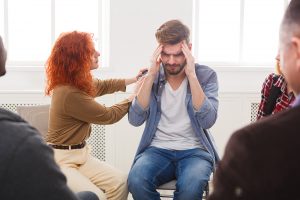
Many people who enter an alcohol or drug rehab find out that they’ve been struggling with Post Traumatic Stress Disorder (PTSD).
This oftentimes helps them make sense of the way they’ve been suffering through life, as well as turning to alcohol or drugs in the first place.
What Is PTSD?
PTSD is a mental disorder characterized by debilitating symptoms that occur as a result of experiencing or witnessing trauma. The kind of trauma could be what is considered “Big T” or “little t” trauma.
Big trauma maybe something like experiencing abuse, a natural disaster, rape, war, kidnapping, violence, an accident, etc. Little trauma may be chronic stress, an event that the psyche or emotional body couldn’t process, or regular emotional overwhelm.
Granted, it’s normal to experience anxiety, fear, painful memories, and so on after a traumatic event. It’s quite a shock to the nervous system and emotional body! Many people can effectively process and release the shock trauma. However, there are plenty of children and adults that can’t for various reasons. These are the ones that may develop PTSD.
Symptoms of PTSD
PTSD used to be referred to as “shell shock”; a term that became popular after war veterans came back from war displaying signs of PTSD.
If you’re experiencing mental, emotional, or physical symptoms long after the initial trauma, you could be dealing with PTSD.
Symptoms may include persistent memories, dreams, nightmares, continual thoughts about the event or experience, feeling numb, anger outbursts, and more.
PTSD symptoms
Here’s a greater look at various PTSD symptoms:
- Re-living the trauma (flashback)
- Persistent memories
- Dreams/nightmares
- Isolating from people or life in general
- Not thinking or talking about the event, repressing it
- Feeling shame or guilt about the event
- Feeling like life is hard and dangerous
- Never feeling safe
- Feeling overly anxious and jittery, always feeling like danger is just around the corner
- Depression
- Substance abuse
- Anxiety
- Shame
- Rage
- Outbursts
- Trouble holding a job
- Chronic pain
- Trouble in relationships, not being able to connect emotionally
- Anger management problems
Reliving The Trauma
If you struggle with signs of PTSD, you may relive the trauma at various times, usually through nightmares or memories throughout the day. The recollections come randomly, and some struggle more than others. Some are more prone to relive the trauma when they are triggered by something that reminds them of the trauma, such as a loud noise.
How PTSD Affects Daily Life
It can be challenging to live with PTSD at times. Many struggle with disruptions in sleep, which can put a serious damper on their days. Others report not being able to feel their feelings (numbing out). This can impact their relationships in a negative way. Still, others may struggle with anxiety or depression, which can affect every area of their life.
Mild or Severe Signs of PTSD
If you struggle with signs of PTSD, you may also struggle with feelings of anxiety, anger, rage, substance abuse, and depression. Your symptoms may be mild, or they may be severe. You may be doing fine, and then for no apparent reason, you may fly into a rage. Or you may have experienced a trigger and “lost your cool”. This can make it challenging to hold down jobs, relationships, friendships, and more.
Flashbacks
A flashback is when you experience a trigger of some sort and you relive the trauma all over again. You may hear a gunshot and suddenly, you’re reliving the trauma of being at war. You may smell the mud, hear weapons firing, people screaming, feel terrified, and so on. The person experiencing the flashback temporarily loses touch with reality, experiencing the trauma for a few seconds, minutes, or hours.
PTSD And Substance Abuse
It’s not uncommon for those struggling with PTSD to reach for a drink or drug to try to decrease the mental, emotional, or physical pain they’re feeling. This act of self-medication, however, can lead to substance abuse.

Treatment for PTSD
Fortunately, there are treatments for PTSD, usually in the form of psychotherapy and medication to treat specific symptoms like rage, depression or high anxiety.
- Psychotherapy (Talk counselling)
- Cognitive Behavioral Therapy (CBT) – This is a very common treatment for PTSD. There are different types of CBT.
- Cognitive Processing Therapy (CPT) is one where you’ll spend some time learning how the trauma changed your perceptions, thoughts, and feelings. When you can think about the trauma differently, your feelings can change.
- Prolonged Exposure (PE) is another type. Here you’ll repeatedly talk about your trauma until the negative feelings you have toward it decrease or dissipate. You sort of desensitizing yourself this way, even going to places that you once avoided because they acted as triggers (as long as they are safe places).
- Eye Movement Desensitization and Reprocessing (EMDR) – this type of therapy concerns the patient putting attention on various sounds and hand movements while they talk about the trauma. This will help re-wire the brain as it works through the traumatic memories.
- Somatic Experiencing – The work of Peter Levine has been found quite effective at treating PTSD. Practitioners work with the mind/body connection, helping patients reconnect with the stored trauma energy in the body and release it in a safe, natural way.
Medication for PTSD
Medication can certainly be helpful too for PTSD. Some are prescribed SSRIs and SNRIs, which have been found to be helpful for those struggling with signs of PTSD. A discussion with a psychiatrist will be helpful in determining if medication is necessary for treatment.
Oftentimes, both counselling and medication combined can prove quite helpful.
If you’re struggling with memories of trauma, reach out to a therapist who has experience treating PTSD patients. You do not have to struggle and you’re not alone. There are various treatments out there, and sometimes it takes trying out several before finding one that works for you.
There are specialists who specialize in PTSD, always staying abreast of the latest cutting-edge treatments that may benefit those with signs of PTSD. Do a little research to see who is specializing in your area. Don’t be ashamed or afraid to reach out for help. You deserve a life free from the debilitating effects of PTSD.